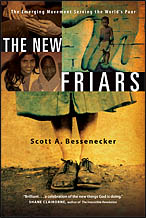
It's written by Jim Cymbala, the pastor of the Brooklyn Tabernacle. I read it because I was at a point of desperation, and realized what I needed was the Holy Spirit. Reading this book reminded me of a lot of truth, and is definitely affecting my outlook even now. I long for the Word of God even more, but realize that is not enough. I also need the moving Spirit of God, the same one that inspired the Word, to be at work. We don't need to fix ourselves before we can follow God and walk in power; rather, we need to confess to God and ask for his power, and then let his Spirit work in us.
"Where the Holy Spirit is not honored as the one through whom the whole life and power of gospel salvation is to be effected, it is no wonder that Christians have no more of the reality of the gospel than the Jews had of the purity of the Law. . . . For the New Testament without the coming of the Holy Spirit in power over self, sin, and the devil is no better a help to heaven than the Old Testament without the coming of the Messiah.
The Pharisee rested so thoroughly in the law, that he rejected the Saviour to whom the law directed him. The sound evangelical thinks that when he has mastered the letter of the gospel, he thereby knows its truth and power. And thus, while claiming allegiance to Paul's doctrine, he knows little of Paul's spiritual experience which caused him to say, 'I can do all things through Christ who strengthens me.'" John Wesley, 25
"This is truly amazing. It is the opposite of what we hear in our day. 'Just get a good theological education, and then go out to preach the message you've learned in the classroom.' But we are finding in churches all across the country that preaching alone does not cause conversions, does not result in baptisms, and does not expand the kingdom of God. Most churches are making no dent in the masses of unbelievers all around them.
We can blame tough neighborhoods, New Age thinking, and immoral entertainment all we want. But when has the environment not been difficult for the gospel? Think of what the early church faced in hostile Jerusalem and the pagan Roman Empire. yet the received power from on high and did exploits for God instead of just talking to themselves. Their preaching and witnessing had a dimension of supernatural ability that we are sadly lacking today.
Now a lot of us type A personalities don't want to hear the instruction 'Wait.' We are eager to get going. But we will accomplish far more if we spend time waiting for the power of the Spirit." (31)
He talks about how he studied a basketball drill book and practiced standard moves thousands of times, and then about how when he later played in college, he moved fluidly and was able to just react as the game unfolded. "God intended his work--everything from teaching a Sunday school class to pioneering a brand-new missionary effort--to be marked by a similar flow of a spiritual kind. The Bible calls it being 'led by the Spirit' (Romand 8:14; Galatians 5:18). Yes, there are important doctrinal principles to learn and biblical facts to nail down, but at the same time, only God and the Holy Spirit can weave them all together in a seamless, almost unconscious way so we can touch people with God's message of love. What we need is that unique merger of divine truth, human personality, and Holy Spirit gifting that produces effective ministry for Christ." (140)
He who was seated on the throne said, "I am making everything new!" Then he said, "Write this down, for these words are trustworthy and true."
He said to me: "It is done. I am the Alpha and the omega, the Beginning and the End. To him who is thirsty I will give drink without cost from the spring of the water of life." (Revelation 21:5-6
"I am aware that some people shy away from the Holy Spirit because they have grown up in churches where his name is almost politically incorrect. Instead, the focus has been solely upon the Word of God--studying it, dissecting it, memorizing it, comparing one version against another, analyzing the Hebrew and Greek texts, making promises to obey the Bible in all things... Yes, we all must honor and love the Word of God, but there is no getting around the fact that the Bible makes tremendous statements about the Spirit of God! In fact, not only did the Holy Spirit inspire the Scriptures, but he is also ready, willing, and able to fulfill those promises concerning himself." (193)
The titles of the chapters give good reminders of what the Spirit wants to give us, something from heaven, Spirit-filled preaching, a house united, use of the unqualified, getting people out of their prisons, a different "strategy," joy and a whole lot more through hardships.




